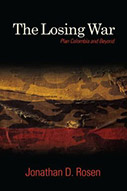The Losing War: Plan Colombia and Beyond

Author: Jonathan D. Rosen
Publisher: Albany, NY: State University of New York Press, 2014. 200p.
Reviewer: David A. Marvelli | March 2015
Jonathan Rosen’s Losing War provides a compelling evaluation of Plan Colombia from its inception in the late 1990s to current efforts by the United States to de-securitize the Colombian conflict. Rosen demonstrates that despite the billions of U.S. dollars spent to assist Colombia in combating the illicit drug trade, Colombia has only achieved partial successes under a shifting and evolving bilateral policy. In particular, Plan Colombia provided Colombia with the necessary resources to dismantle the Cali and Medellin Cartels and substantially weaken the Revolutionary Armed Forces of Colombia (FARC). However, in its efforts to combat these non-state actors, Colombia has been marred with claims of human rights violations and evidence that the illicit drug trade continues to flourish.
A unique insight that the Losing War provides to the analysis of Plan Colombia is the active role former Colombian President Alvaro Uribe played in reorienting the US anti-drug policy toward combating the FARC. According to Rosen, President Uribe was able to convince the United States to not only continue to fund Plan Colombia but increase its funding under a new mandate to combat the FARC, a “narco-terrorist” organization. Colombia viewed this reorientation as necessary because President Uribe’s predecessor Colombian President Andres Pastrana, in his efforts to negotiate a peace treaty with the FARC, conceded a substantial amount of Colombian territory—the so called “demilitarization” zone—to the FARC. The FARC used this territory as a safe haven to continue to produce cocaine and conduct operations against military personnel and civilians.
While the United States, in the aftermath of the 11 September 2001 terrorist attacks, was willing to fund Colombia’s campaign against the FARC under Plan Colombia, Rosen demonstrates, through the use of budgetary and official speech acts analyses, that the United States in 2008 began to “de-securitize” Colombia by defunding Plan Colombia and altering its official rhetoric to suggest Colombia was no longer a national security threat. For its part, in late 2012, the Government of Colombia (GoC)—under President Juan Manual Santos—began to re-negotiate a peace treaty with the FARC though the outcome of these negotiations remains uncertain. As of this writing, the peace treaty negotiations are still underway in Havana, Cuba.
Despite GoC’s efforts to negotiate peace with the FARC, the FARC is not the only non-state actor threatening security in Colombia. The National Liberation Army (ELN), for instance, continues to operate in Colombia along with a countless number of cartelitos—mini cartels—which continue to traffic illicit drugs. And even if peace negotiations are successful with the FARC, it is not clear if all members of the FARC will abandon the illicit drug trade. Moreover, the defunding of Plan Colombia by the United States without an alternative bilateral agreement has left Colombia seeking alternative financial aid from emerging superpowers, which could potentially alter future US-Colombia relations.
The Losing War is a very important and timely text for understanding US-Colombia relations and the current events unfolding between the GoC and the FARC. While Rosen calls into question the value of Plan Colombia as an illicit drug reduction policy, Plan Colombia did provide the GoC with the resources it needed to dismantle the Medellin and Cali Cartels and substantially weaken the FARC, which threatened regional stability. This book is a must read for policymakers, law enforcement and intelligence officials, and academics.
David A. Marvelli is a supervisory intelligence analyst for the Federal Bureau of Investigation. He has served as an FBI Liaison Officer to the Drug Enforcement Administration and is a recipient of the FBI Director’s Award for Excellence. He received his PhD from Rutgers University.
The views and opinions expressed herein are those of the author and do not necessarily reflect the views of the Federal Bureau of Investigation, the Drug Enforcement Administration, or the U.S. Government.


